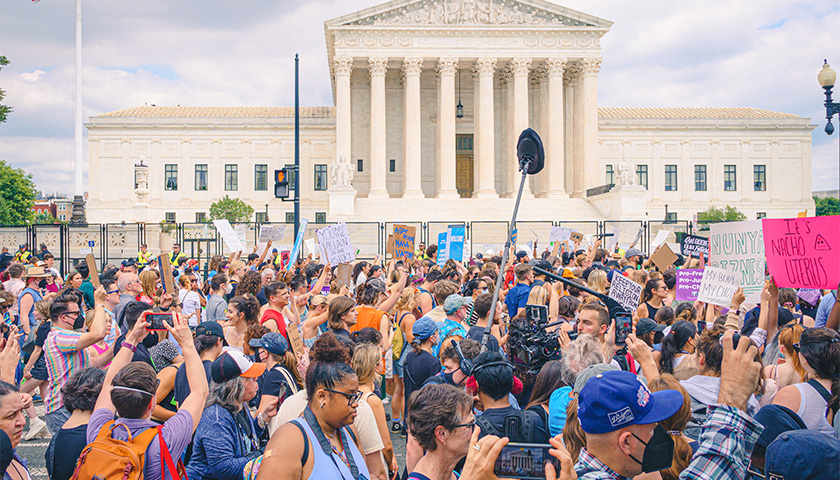by Elizabeth Eastman
There is great irony in the violence directed against pregnancy centers since the leak and then official release of the Supreme Court’s Dobbs v. Jackson decision. Reports of vandalism and destruction include graffiti such as “if abortions aren’t safe neither are you” and firebombing.
Pregnancy centers across America offer many services to women and men, their unborn children, and children post-birth—including pregnancy and sexually transmitted disease testing, ultrasounds, counseling, diapers, clothing, medical referrals for healthcare or community resources, and parenting classes. These services are provided free and funded by donations.
If the people protesting the reversal of Roe v. Wade are claiming women’s health is endangered by limiting or ending access to abortion, then why target pregnancy centers? The pregnancy center in my local community states on its website: “Our Center does not offer, recommend or refer for abortions or abortifacients. We are committed to offering accurate, up-to-date information about abortion procedures and risks.”
In the interest of women’s health and well-being, should a woman not be fully informed about the risks related to terminating her pregnancy? Are the protesters instead trying to intimidate those who offer these services and eliminate places where one can get information about making an informed choice? What motivates these protesters?
Alexis de Tocqueville observed that one of the dangers of democracy is when individualism and selfishness take hold and the individual relates everything to himself alone, preferring himself in everything. His remedy for this extreme individualism is found in uniting a particular interest to the general interest. In other words, we can avoid a situation where individuals have reference only to themselves by getting them interested and invested in the public good. Tocqueville argues this is accomplished by virtue of free institutions in which all can participate, primarily through the vehicle of political and civic associations. The individual may consider how events relate to himself, but participation in associations hinders him from devolving into selfishness. These associations are part of the civil and political fabric of America.
Thus the targeting and elimination of pregnancy centers works at cross purposes, preventing a valued resource from being part of civil communities. It may be an association that has a particular mission of serving women and men who seek their services, but it reaches into the community as well. The donors and volunteers who support their efforts through funding, goods, and services recognize that sustaining the pregnancy center in their community redounds to the benefit not only of unborn children and their parents but the entire community. It is a reaffirmation that the unborn—the most innocent, vulnerable, and precious human lives, which are deserving of care and protection. It also values women who become mothers.
Whether they choose to raise the child or offer the child to a couple through adoption, they unite, in Tocqueville’s words, particular interest to the general interest.
Our Declaration of Independence from the British recognizes the natural rights to life, liberty, and the pursuit of happiness. While Americans embrace rights, an overemphasis on rights can sometimes mislead us (as in the so-called right to an abortion) so that we are tempted to exclude consideration of everything and anyone else. Are rights an end in themselves, or are they a foundation of and means to happiness and a good life? Selfish individuals wrongly assume that rights are an end in themselves and disregard how they fit into the community as a whole.
Some 15 years after declaring independence, the American people ratified a Bill of Rights. As with the associations Tocqueville heralded, an advantage of having a bill of rights is that it can serve to unify the citizenry.
First, a bill of rights promotes the concept that we are one people who can appeal to rights that are acknowledged and that there is a starting point to remedy differences.
Second, what is protected and safeguarded—freedom of speech and the press; peaceable assembly and the right to petition the government; the rights of citizens to protect their life, liberty, and property; and the procedures that support justice—are activities that support establishing and maintaining good political communities.
Third, a bill of rights serves to encourage citizens to respect the rights of others. This is related to Tocqueville’s point about preventing the individual from tending toward selfishness and instead toward the community of which he is a part.
Fourth, a bill of rights is a reminder that governments are instituted to secure rights and not diminish them. It serves to clarify the relationship between the government and its citizenry.
The American people must realize that attacks on pregnancy centers are attacks on women and those in the community who aim to promote a culture of life. The motivations of those who perpetrate these attacks are not only dangerous but strike at the heart of what supports America at its best.
– – –
Elizabeth Eastman holds a Ph.D. in Political Science from Claremont Graduate School, an M.A. in Liberal Education from St. John’s College, and a B.A. in French Literature and Civilization from Scripps College. She has taught in political science and history departments and in the liberal studies programs at colleges and universities around the country. She was the 2020-21 senior scholar in residence at the Benson Center for the Study of Western Civilization in Boulder, Colorado.
Photo “Roe v. Wade Overturned, U.S Supreme Court” by Ted Eytan. CC BY-SA 2.0.





